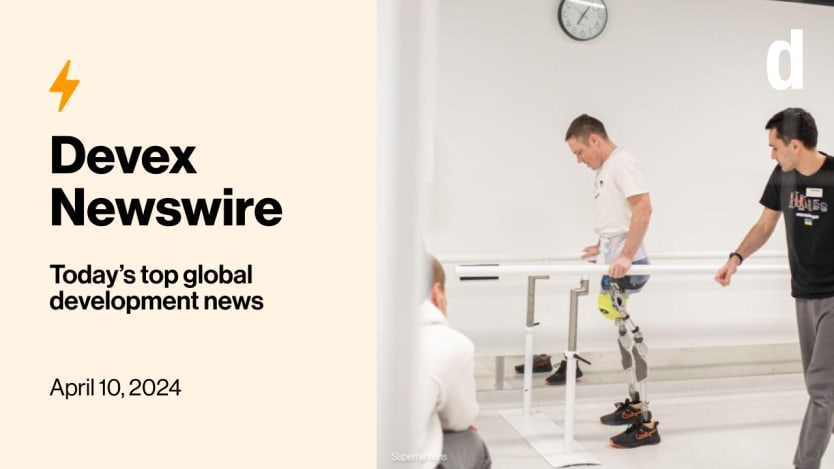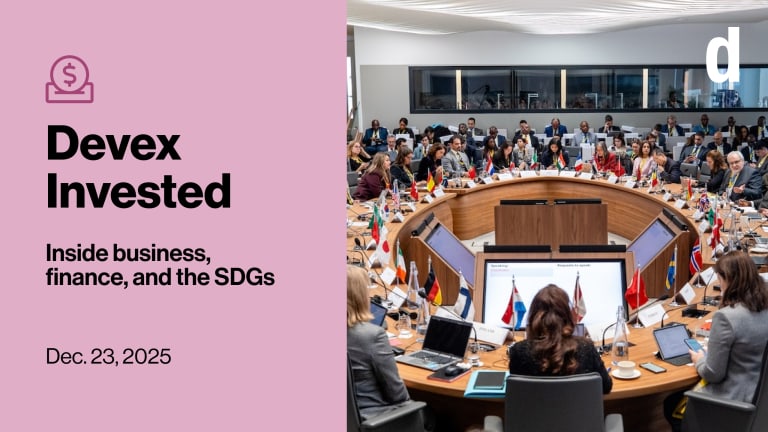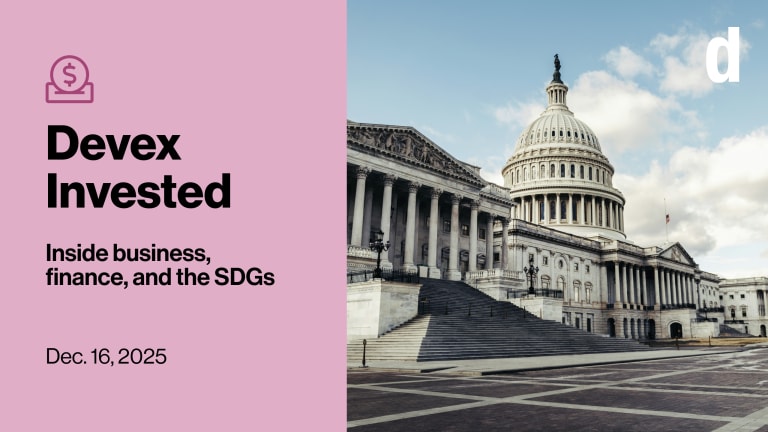Presented by The Mastercard Center For Inclusive Growth

In high-risk environments, insurance becomes a necessity. With aid organizations and philanthropists keen to operate in places such as Ukraine, the U.S. International Development Finance Corporation steps in, offering crucial protection against potential disasters.
Also in today’s edition: The battle to secure the direction of the European Investment Bank, and what’s behind Sweden's decision to end NGO funding.
+ Download your copy of our newly updated report on the localization agenda, which tracks USAID’s and global development leaders’ localization progress since the start of the decade.
Superhumans and DFC
In the world of insurance, the “nice to have” becomes the indispensable when stakes are high. Imagine pouring millions of dollars into a project in a high-risk, war-torn, or politically dubious environment — that’s when insurance becomes the choice between proceeding confidently or risking all.
And that’s certainly the case for many aid organizations. About a year ago, the Superhumans health facility opened in Ukraine’s war-ravaged city of Lviv to treat those who had lost limbs. It raised money from global philanthropists wanting to support the nation in its fight against Russia and turned to the U.S. government for help to bring in investments.
This is a preview of Newswire
Sign up to this newsletter for an inside look at the biggest stories in global development, in your inbox daily.
That’s all well and good, but what if disaster strikes? What if the hospital is bombed, leaving investments in the rubble? Enter the U.S. International Development Finance Corporation, which offers a shield against such uncertainties.
With $25 million in political risk insurance from DFC, Superhumans could tell donors their investment is protected and the hospital could be rebuilt if needed. “Apart from DFC, no one is willing to insure against war risks. They are the first to enable projects and provide this coverage,” Philipp Grushko, co-founder of Superhumans, tells Devex Senior Reporter Adva Saldinger.
Now DFC wants to further expand its use of political risk insurance — protections against violence, government defaults, or political changes making it impossible to operate or get your money out. It wants to focus specifically on Ukraine and addressing global climate challenges through debt-for-climate swaps. Last year, its political risk insurance exposure was about $7.3 billion.
“It’s been a really successful product and that's why we want to increase it,” Agnes Dasewicz, DFC’s chief operating officer, tells Adva.
The expansion, however, faces an obstacle. The U.S. government’s budget office is pushing back against how the agency pays for these deals and, which could significantly hamper DFC’s ability to expand its use of the financial tool.
Read: In Ukraine and beyond, the US DFC boosts its political risk insurance
And next up for DFC …
As DFC gears up for reauthorization next year, its focus lies in expansion, rigorous due diligence, and enhanced collaboration. Nisha Biswal, DFC’s deputy CEO, highlights how the biggest bilateral development finance institution has progressed since its inception in 2020, noting a significant shift in global impact.
“We've moved the needle quite a bit,” she said during a recent Devex Pro Live event, adding that DFC has exposure close to $44 billion against a $60 billion cap mandated by the U.S. Congress.
As DFC awaits its reauthorization, Biswal envisions a transformative future for DFC, one characterized by state-of-the-art practices and an unwavering commitment to advancing U.S. interests in global development.
But what does that look like? “And what [does] the next iteration of the BUILD Act [which established DFC] look like that allows us to get there?” she asks.
Part of the answer is a simple question of money. While DFC currently has a maximum contingent liability of $60 billion, it wants that raised to $100 billion. “The demand is out there,” Biswal said. “And I think we can move the financing to meet that demand if we have the running room to do that.”
Read: The future of the US International Development Finance Corporation
Up in arms at EIB
A fierce battle is raging at the heart of one of the biggest multilateral institutions: the European Investment Bank. The stakes? Its foundational principle that bans weapons and ammunition financing and its pivotal role in shaping global stability.
As Russia's assault on Ukraine continues, pressure is mounting for EIB to shift focus toward bolstering Europe's defenses. But should EIB uphold its ethical stance, as it did championing sustainable development and eschewing fossil fuels, or succumb to the push by EU leaders demanding a militarized response to Russian President Vladimir Putin's belligerence?
It is a decision with moral, economic, and practical implications, Devex U.K. Correspondent Rob Merrick writes. It’s a “critical moment for the institution,” argue worried civil society groups, and even an “existential question,” as one source familiar with the bank called it.
At the forefront of the tussle is European Commission President Ursula von der Leyen, wielding a new defense industrial strategy as her political linchpin for a second term. Unveiled last month, the strategy urged EIB to “adapt defence-related exclusions” to “support production of military equipment and more generally the European defence industry” — and to do it quickly.
The European Parliament has backed the move, and the bank’s new president, Nadia Calviño, appears keen, declaring it “ready to do more to contribute to European security, protection and deterrence” in her “vision” for the bank’s future, Rob writes.
All will be revealed on Friday in Luxembourg at a meeting of finance ministers from the 27 member states of the European Union, which jointly own EIB. Discussion is likely to be heated, with opinions divided in different EU capitals.
Read: ‘Critical moment’ as EIB wrestles over move into weapons financing
Freezing Swedish aid
Sweden has set off worrying signals across the global development landscape. In a bold move unveiled last month, the right-wing administration declared it would sever all funding ties with Swedish NGOs by year-end.
This decision marks a pivotal moment and is framed as a reform aimed at refocusing aid efforts on "Swedish interests and humanitarian support." Alongside this move, the government has initiated an aid freeze, signaling real-term reductions, while redirecting attention toward trade, immigration, and a departure from funding the most impoverished nations.
But it's the termination of agreements with 17 strategic partner organizations, all Swedish NGOs, that has ignited the most furious debate, Burton Bollag writes for Devex. Under the new rules, NGOs — domestic and international — will vie for funding, including NGOs in low- and middle-income countries receiving the assistance.
While the government says the changes will streamline aid delivery and better support civil society organizations in recipient nations, members of the Swedish development sector raise important concerns. They argue the reforms are hasty and ill-conceived, jeopardizing ongoing projects, and endangering partnerships with nearly 2,000 partner NGOs.
Anna Tibblin, secretary-general of We Effect, one of the affected organizations, paints a dire picture of the fallout. “This process will destroy the results of Swedish development aid and entail an enormous waste of both human and financial resources,” she wrote in a statement. “And those who pay the price are the people living in poverty we work to support. It is neither effective nor sustainable and risks damaging Sweden’s reputation.”
Read: Why Sweden tore up its funding agreements with its NGO partners (Pro)
+ A Devex Pro membership gives you access to all our expert analyses, funding data, the world’s largest globaldev job board, exclusive events, networking opportunities at our summits, and more. Not a Pro member yet? Start your 15-day free trial today.
In other news
A landmark judgment at the European Court of Human Rights found Switzerland in violation of human rights for failing to address climate change. [CNN]
Infections acquired in hospitals, which could be avoided with improved sanitation, cost sub-Saharan countries as much as $8.4 billion each year. [The Telegraph]
The cost of U.S. effort to build a humanitarian pier off Gaza is at least $180 million, but with U.S. troops not allowed to go onshore, it remains unclear who will bring and distribute the aid. [ABC News]
Sign up to Newswire for an inside look at the biggest stories in global development.








